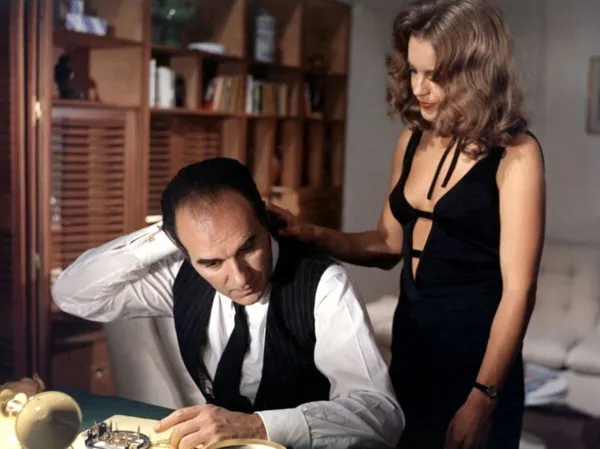 |
| Michel Piccoli and Romy Schneider in Max Et Les Ferrailleurs - Bertrand Tavernier: "I see Claude Sautet as the son of Jacques Becker." |
In the third and final installment of my conversation with Bertrand Tavernier on his Journey Through French Cinema (Voyage À Travers Le Cinéma Français) he discusses his dedication to Jacques Becker (Casque D'Or, Touchez Pas Au Grisbi, Édouard Et Caroline) and Claude Sautet (Max Et Les Ferrailleurs), Mireille Balin's dress in Jean Delannoy's Macao, l'Enfer Du Jeu (Gambling Hell), Jean Gabin, not forgetting Jean-Pierre Melville's Army Of Shadows (L'Armée Des Ombres), Léon Morin, Prêtre or Le Silence De La Mer, Jean Paul Gaultier and Falbalas (Paris Frills), Mila Parély in Coco Chanel, Jean Renoir's A Day In The Country (Partie De Campagne), Joseph Kosma, Sylvia Bataille and Jacques Lacan, Howard Hawks's Red River and Only Angels Have Wings, and not having to see Rio Bravo ever again.
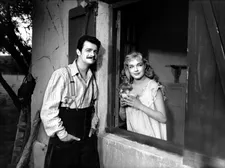 |
| Serge Reggiani and Simone Signoret in Jacques Becker's Casque D'Or |
Anne-Katrin Titze: You dedicate the film to Jacques Becker and Claude Sautet. Two of the greats. You probably could have dedicated it to many more?
Bertrand Tavernier: Many more. But I see Claude Sautet as the son of Jacques Becker. There is a link between them which has never been studied or acknowledged. If you look closely, you'll discover that most of the films of Jacques Becker were not very well received. Now they are. But Casque d'Or was attacked by most of the critics when it came out and it was a failure. Now it seems absolutely impossible to understand why.
The same way Sautet for a long time was judged by a certain part of the critique as somebody bourgeois, typical of the Fifth Republic. I mean, most of his films speak of the beginning of unemployment. You have little enterprises closing down. You have a spirit of melancholy in his films, of loneliness, of sadness. Not mentioning Max et les ferrailleurs, which is a very dark, kind of sombre film. In a way a pessimistic film about police manipulation.
I think it's superb. It's a great masterpiece. There was the same reproach against the comedies of Becker. The communist critics could not understand that Becker was spending time doing le Grisbi gangsters or doing films like Édouard Et Caroline. You should spend your talents talking about workers, people working in factories or people who make bread! And when you see the film now, the film is so modern, so intelligent.
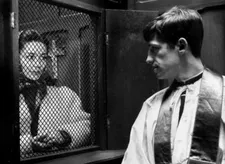 |
| Emmanuelle Riva and Jean-Paul Belmondo in Jean-Pierre Melville's Léon Morin, Prêtre |
AKT: About work, too.
BT: About work, about women - in the case of Édouard Et Caroline. In the case Grisbi, it's about one of the first heroes who is a kind of anti-hero. He doesn't want to fight. He doesn't want to kill. He wants to retire, he wants to sleep early, he doesn't want to be bothered by women. This is the destruction of the romantic myth of Gabin. And it predates all the anti-heroes of the American cinema of the Sixties.
AKT: You have this beautiful scene from this film. The bathroom scene with Gabin looking in the mirror. And you say, this would have been impossible in an American film at the time.
BT: Gangsters talking about brushing their teeth? I mean, that's impossible! Even if he is inspired by the American films, he is doing the opposite. I could have also picked the scene where they are eating foie gras, which is an unforgettable scene.
AKT: I like how you point out so many details that are easily overlooked. I presented La règle du jeu at the Alliance Française in their Haute Couture on Film programme. The focus was on fashion and the costumes by Coco Chanel. I've seen this film so many times and never noticed this detail before.
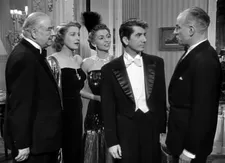 |
| Bertrand Tavernier on Jacques Becker: "About work, about women - in the case of Édouard Et Caroline." |
When Mila Parély arrives in the rain, wearing the ocelot coat - which belonged to Coco Chanel herself, by the way - she takes off the belt from the coat. She takes off the coat, hands it over to someone. And then she puts the belt back on! Between her shirt and her skirt. It's happening right in front and I never noticed it. That's the genius of Renoir - who has so much going on at once.
BT: Absolutely! Speaking about dress, I think the dress of Mireille Balin in Macao which I show, the dress which has the big décolleté in the back, practically stopping just before her butt, is one of the most beautiful dresses. And she has one of the most beautiful backsides of the French cinema! This is an incredibly beautiful dress and she is stunning in it.
There is that shot of it and I'd found an archive in which Delannoy said that he thought she was so beautiful, she had, he said, the most beautiful backside of the whole French cinema. So he decided to have an open dress on her back. Nothing, no bra and it's very very daring and I found her, the way she moves in it, absolutely stunning. And it's just a film that is not very well known, but very enjoyable.
Macao is very enjoyable - the mood of the film, the twist in the plot, Erich von Stroheim or Sessue Hayakawa, this is lovely. And the way they redid Macao, I think in the South of France, is quite amusing.
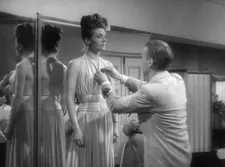 |
| Bertrand Tavernier: "Falbalas! It's a superb film about Haute Couture." |
AKT: Continuing with fashion, what is the film Jean Paul Gaultier is talking about?
BT: Falbalas! It's a superb film about Haute Couture.
AKT: And he says this film inspired him to become a designer?
BT: Totally. And he says that he is watching the film every year. And he cries every time.
AKT: Speaking of crying now, you say that no ending moved you as much as A Day In The Country?
BT: It still makes me cry when I see it. The music of [Joseph] Kosma at this moment! And Sylvia Bataille, when she says: "Me, I'm thinking all the time about that." This is so poignant.
AKT: And what she does with her mouth at that moment. That little thing.
BT: Yeah. This is incredible. And thinking she became the wife of Lacan, the philosopher, after that.
AKT: Yes, I know! I actually thought about that when I saw the clip in your film.
BT: It makes it even more interesting.
AKT: Empathy is very important for you?
 |
| Bertrand Tavernier on the ending of A Day in the Country: "Sylvia Bataille, when she says: 'Me, I'm thinking all the time about that.' This is so poignant." |
BT: Yes. I wanted to only talk about films I had tremendous feeling for. I'm not interested in giving good marks and bad marks. Sometimes I mention that there is a film that I like less or something I do not like. For instance in Melville. I want to mention that because I think part of his work is underrated. The fact that we only speak about his crime films.
They are forgetting, for me, Léon Morin, prêtre or Le Silence De La Mer which are some of his most personal works. Or Army of Shadows, which is a masterpiece. I'm not interested in destroying a film. So when I talk about Marcel Carné, I avoid the films I do not like. I'm not crazy about Les Visiteurs Du Soir, so I will not talk about it.
AKT: You have so much in this film, why should you?
BT: To lose time. Also because I can be wrong. With my old age and my experience, I discover that most of the time the people who were right were defending the films, not the people …
AKT: … wanting to destroy them?
BT: Yeah. A lot of attacks were unfair, unjustified. In this country, there are many, many examples of articles which were brilliant but unfair. How can you judge, how can you know the truth about a film by just seeing it once?
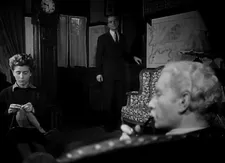 |
| Jean-Pierre Melville's Le Silence De La Mer |
AKT: I totally agree with you.
BT: For some books, it really took me time before I really understood them. For some films also. There are films which I liked better when I saw them five or six years after. Suddenly I discover things which I had not seen. I think some of the great films, you can watch them a lot of times. And some of them, sometimes …
AKT: Die on you?
BT: Yes. I'm not sure I want to see again Rio Bravo. I think I have exhausted everything which is good in Rio Bravo.
AKT: I'm not there yet with Rio Bravo.
BT: I have not exhausted the great things which are in Only Angels Have Wings. Or even in Red River. But Rio Bravo? I think I know its virtue by heart so much.
- Read Bertrand Tavernier's odyssey into the world of French cinema through his masterwork Voyage À Travers Le Cinéma Français.
- Read what Bertrand Tavernier had to say on Ernst Lubitsch's Heaven Can Wait, Lino Ventura and Jean-Pierre Melville, Jean Gabin in Jean Delannoy's adaptation of Georges Simenon's Inspector Maigret, Bernard Blier in Henri Verneuil's Le Président, Nadja Tiller in Gilles Grangier's Le Désordre Et La Nuit, Eddie Constantine, and composers Jean-Jacques Grunenwald, George Van Parys, and Paul Misraki.





















